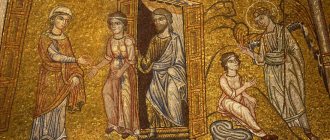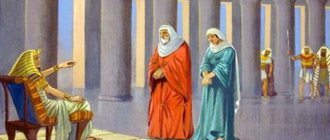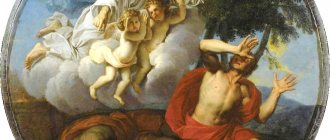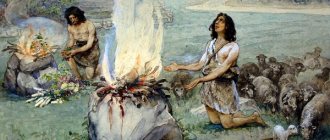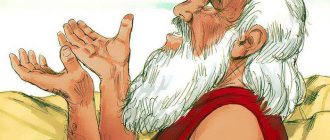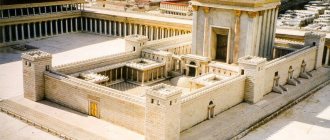The Bible contains many stories that became the basis for the creation of works of art from different eras. An example of this is the legend of David and Bathsheba, the plot of which gained extraordinary popularity in past centuries. Many artists and sculptors depicted the story of their acquaintance, although it was far from refined romance.
“You shall not covet your neighbor’s wife,” this is exactly what one of the commandments sounds like. It was precisely this that David violated. Following the Fall, a whole “chain” of other sins followed. But if this had not happened, the famous King Solomon would not have been born. What does the story of David and Bathsheba tell us? And is woman really the source of sin even here?
Origin of King David
King David was born around 1035 BC, on the west bank of the Jordan River, in Bethlehem. The historicity of David is a source of debate that continues to this day, because many stories about the life of the ruler are in the nature of legends and tales, however, some archaeological evidence proves the reality of the existence of the leader of the Israeli people.
Portrait of King David
The Copenhagen School, founded in 1990, has its own opinion on this matter. Adherents of biblical minimalism view the personality of King David and the reality of the existence of the so-called Kingdom of Israel as a single ideological concept created by the priests in Jerusalem.
Skeptics believed that David was as historical as the hero of the chivalric novels of the British epic - King Arthur. The biography of the descendant of Jesse, which is set out in the Holy Scriptures, says that he came from an ancient Jewish family (from which the Messiah Jesus Christ came) and was the youngest of his father’s eight sons.
Young David, working as a shepherd, showed himself to be a trustworthy and brave man: he could snatch his sheep from the clutches of a mighty bear or deal with a ferocious lion with his bare hands, since he was endowed with heroic strength from birth.
David and Saul
While the young man was working in the pasture, the founder of the united kingdom of Israel, Saul, sat on the throne, who became the leader of the people by the will of God, but soon seemed displeasing to the Creator. Therefore, the prophet Samuel, who repented of choosing by lot the “disobedient bearer of the crown,” began to look for a successor to his first anointed one.
His choice fell on David, who in those years delighted the monarch by playing a stringed musical instrument - the kinnor: flowing melodies calmed the anger of the king, who had a hot temper (according to legend, he was “outraged by an evil spirit”).
In his youth, young David, who arrived in the Israeli army to visit his brothers, was noted for his heroic deed: the future king defeated the unusually strong giant Goliath (in the Koran - Jalut). It is noteworthy that David’s opponent was armed to the teeth, while the young man had only a sling with him.
David and Goliath
Saul, who believed in the young man’s ingenuity, promised to bless David’s marriage with his daughter Michal if he went on a campaign against the descendants of Kasluhim. The “heir to the throne” who returned from the battlefield brought a “gift” - a bag with two hundred male assets, because this was the demand of the cruel despot.
The valiant son of Jesse won laurels of honor, and his brilliant fight against the unbelieving Philistines aroused the envy of Saul, since the glory of David eclipsed all the honors of the current king. The zealous Saul began to be suspicious of the young man, and every day his contempt only intensified. Therefore, it is not surprising that the thought of killing his subject crept into Saul’s head.
It got to the point that the Israeli king, without hiding his enmity, put David in danger by throwing a spear at him during the celebration. But since Saul had too much alcoholic drinks, the gun flew past. But, nevertheless, the autocrat threatened to put the enemy in prison.
Young David
But it is worth noting that David revered the Creator and did not dare to raise his hand against God’s anointed Saul, but he had the opportunity when they found themselves alone in a cave. The young man quietly crept up to his opponent and cut off a piece of fabric from his cloak, thereby showing Saul that he was incapable of committing a crime and did not pose any danger.
This act did not relieve Saul of his paranoia, so David fled to Samuel in Ramah and arrived at a refuge where God's presence was strong. There David learned that reconciliation with Saul was impossible, and the king himself was filled with the Spirit of God. Consequently, the future ruler of the people spent many years in exile, trying to save his life and shelter his relatives from the wrath of the first anointed.
David receives news of Saul's death
Saul angrily pursued the enemy, so David, along with numerous comrades, found support from his opponents - the Philistines. In the service of this people, David and his comrades (600 men) robbed the local Amalekites, and sent part of the stolen loot to King Achish.
David's companions, due to the objections of higher authorities, did not participate in the invasion of the Philistines, who went to conquer the lands of Israel and defeated the troops of the despot Saul. In the battle of Mount Gilboa, the soldiers killed the king's sons, and Saul himself asked his subject to wound his heart with a spear.
Failed plan
According to the laws of Moses, a woman who committed fornication should be punished by death. Her lover had to share her fate. Of course, if David had ordered Bathsheba never to mention his name, she would not have betrayed the ruler. But the king was sincerely sorry for his beloved. On my own behalf, I want to note that David, it seems, really loved Bathsheba, but he valued his own position no less.
However, David was a king, which means he had both opportunities and a calculating mind. A wonderful plan was born in his head that was easy to implement. David immediately called Uriah out of the army, ostensibly to find out about the situation on the battlefield. Having given the warrior some wine, he sent him home, advising him not to be timid in front of his wife, whom he had not seen for a long time. However, along with Uriah, he also sent spies to report on the progress of affairs.
In the morning the king was disappointed. Instead of making love with his wife, Uriah sat all night on the threshold of his home. As he noted, he has no time for passion in those moments when his comrades lay down their heads on the battlefield. It turned out that there was a child who was supposed to appear in the near future. could not be passed off as the son of Uriah.
Rembrandt “Bathsheba with a Letter from David”, 1654 Location: Louvre, Paris, France
Beginning of reign
David was not happy at the news of the death of his pursuer, but, on the contrary, burst into bitter tears. Then he arrived at his homeland, Hebron, where he was proclaimed king of Judah by the descendants of Judah.
King David
Consequently, Judah separated from Israel (Saul's only surviving son, Ishbosheth, became Saul's successor), resulting in a two-year internecine war.
Two armies opposed each other, and David’s comrades emerged victorious from this bloody battle, but, according to rumors, the outcome of the matter was decided by betrayal, for the two warring commanders were killed. David was eventually chosen by the elders to be king over all of Israel, later uniting the two states.
The Troubles of David and Bathsheba
And here I want to draw your attention - there is not a single word that Bathsheba herself seduced David. While bathing, she had no idea that the king was watching her. She could not refuse him, especially since the king’s “servants” came to visit her. Obviously, if she refused, they would force her to go to the palace, because David ordered not to return without the beauty.
Of course, Bathsheba was not a “sinful vessel,” but the situation turned out to be truly paradoxical. David had fun with Uriah's wife, and Uriah himself fought bravely on the battlefield, defending the honor of his state and, of course, the king. At first glance, it seemed that the intrigue with Bathsheba was another success for David, but in reality it was not so.
After some time, the woman informed the king that she was expecting a child. It was impossible to pass off the child as the son or daughter of Uriah - he was still on a military campaign. David was seriously alarmed.
Pedro Berruguete "King David", 15th century
Domestic policy
Before becoming ruler, David, following a cruel custom, got rid of the descendants of King Saul. Then the commander went to war against the Jebusites, capturing the city of Jerusalem. Conquered Jerusalem became the capital of the principality and, concurrently, the sacred Jewish center, where the Ark of the Covenant was transferred, making the main city the center of the national cult.
Weeping David
By the way, the Ark of the Covenant is the greatest shrine of the Jewish people, which is located in a tent guarded by priests. David initially wanted to build a temple for the altar, but was unable to do so because his hands were stained with the blood of his enemies. Therefore, his son Solomon began building the church.
David, who rejected human sacrifice, carried out a religious reform and became the author of exalted psalms. The services acquired a melodic character, for David did not forget his passion for playing a stringed instrument.
King David
The king subordinated spiritual life to secular life, and the priests began to submit to the high priests. David was also noted as a brilliant commander: the defeated peoples paid tribute to the owner of the throne, so the monarch organized the treasury and established a detachment of state bodyguards.
It is known that David began to strengthen his state, following the Egyptian model, and the royal property was managed by officials. On top of that, David was engaged in a census, but by the will of the Lord he never completed what he started.
Life of David
David was the youngest son of one of the elders of Bethlehem, Jesse. As a young man, he tended flocks of sheep, showing fearlessness in fights with wild animals. Thanks to his meek character and deep faith, even in adolescence he received a blessing from God to become the king of Israel.
Saul, who ruled the state at this time, became disliked and abandoned by the Lord for disobedience, and was obsessed with fits of uncontrollable anger. Having heard about David, who became a skilled musician, he invited him to the court to pacify his pain.
Soon, at the age of 18, he defeated the most powerful warrior of the Philistines, Goliath, ending the war. After this, he was appointed commander of the Jewish army and married the king’s youngest daughter, Michal. With his courage and military successes, he gained the love and respect of the people, thereby incurring assassination attempts and persecution from King Saul, which continued until the latter’s death.
Fleeing from persecution, David and his supporters (600 soldiers) fled to the lands of their former enemies - the Philistines. King Achish allowed him to settle in the city of Ziklag. David and a small army raided the Amalekites who lived in the area, giving part of the spoils to Achish. Michal was married off in his absence.
Foreign policy
David expanded his territorial possessions, taking lands from neighboring states. He conquered the historical region in western Jordan, defeated the Arameans in Syria, and annexed Idumea. In addition, the king discovered treasures of copper and entered into business cooperation with the Phoenicians, who were known as experienced traders.
Kingdom of Israel under David's reign
The Phoenicians bought cereals and livestock from David, paying by barter. In return, the king received wood and advanced technologies: David’s companions brought writing and the alphabet they invented to the state, which was later borrowed by the Jews.
Sword of David
After David cut off Goliath's head, he took possession of his sword, but not wanting to use it as a weapon, he takes it to Nova.
For David, the sword is a symbol of the victory of faith in God over weapons. That is why, when he fled from Saul, he takes this sword from the priest Ahimelech.
King Saul at this time continued to fight the Philistines. After the death of him and his eldest son Jonathan and the defeat of the Israelites, David was proclaimed king of the Southern Kingdom with his capital in Hebron. Saul's youngest son Ishbosheth waged war with David for two years, but was treacherously killed by his own commanders. From the moment David becomes the ruler of all Israel.
Personal life
The biblical story says that David was smart, handsome, and also had a talent for oratory. As for amorous relationships, Saul’s daughter Michal was married to another young man. But nevertheless, the woman-loving David had many wives and concubines, which, in principle, was typical of the kings of that time.
But because of David’s amorousness, the king’s internal policy was not cloudless. The ruler of the united Israeli state angered God by darkening his life with a mortal sin - adultery. The fact is that the king, walking on the roof of his palace, was blinded by the beauty of bathing Bathsheba.
King David and his son Solomon
However, the woman who captivated his mind and feelings was married to the beneficent Uri the Hittite, who faithfully served David’s army. But, despite the beauty’s marriage, David ordered Bathsheba to be taken to the palace. After a while, the ruler’s beloved became pregnant, and David ordered the military commander in a letter to send Uriah to certain death.
Having learned about this treacherous act, the prophet Nathan cursed David, dooming his future to fratricidal conflicts and severe punishments. Thus, there was a lot of bitterness and sadness in David's life.
King David in old age
The king began to feel physically unwell, his body became covered with ulcers, and riots began in the palace. The leader's eldest son Amnon raped his half-sister Tamar and was killed by his brother Absalom.
Absalom himself went against his father, but his army was crushed to smithereens. Despite the betrayal, David loved his son and waited for his return home. According to legend, a young man died when his long hair got tangled in the branches of an oak tree. This tragedy darkened the life of David, who lamented:
“My son Absalom, my son, my son Absalom! Oh, who would let me die instead of you, Absalom, my son, my son!
David had to literally beg God's forgiveness on his knees. The Creator forgave the sinful king, giving him a healthy son Solomon, but reminded him that
“...they must pay four times for a sheep.”
After repentance, the autocrat’s life was not calm, for another son of David, Adonijah, the actual heir to the throne, tried to organize a conspiracy against his father and usurp power, because he learned that the crown was destined for Solomon.
Neighbor's wife
Biblical texts say that Bathsheba was an unusually beautiful woman. In her youth, she married Uriah, a glorious warrior who served in the armies of the king of Israel, David. As the legend says, one day the ruler was walking past the baths, where he noticed Bathsheba. At that moment she was just performing ablution. The dazzling beauty of the woman inflamed David's heart. He was not known for his frivolous disposition, but he could not resist here.
When the king was informed that he had seen Uriah's wife (that is, a married woman), David was not at all embarrassed by the news. He wanted Bathsheba to belong only to him. The ruler sent his people to the woman, who brought the king’s chosen one to the palace. The Bible notes:
“David sent servants to take her; and she came to him, and he slept with her. When she was cleansed from her uncleanness, she returned to her home.”
Willem Drost "Bathsheba", 1654 Location: Louvre, Paris, France
Death
David died at the age of seventy, having managed to transfer the crown to his heir Solomon. The successor continued his father’s policy of strengthening the state, however, he condemned bloody wars.
The famous marble statue of David by Michelangelo
It is known that books were written in memory of King David, and in 1997 the television film “King David: The Ideal Ruler” was released. But the most famous cultural monument is the marble statue of David, skillfully made by the talented Michelangelo.
The king's crime
Now things took a really serious turn, and David took extreme measures. He took sin upon his soul. David sent a message to one of the generals, Joab, in which the smart warrior discerned a very clear hint. The Bible says:
“Therefore, when Joab was besieging the city, he placed Uriah in a place where he knew that there were brave people there. And the people went out of the city and fought with Joab, and several of the people, of the servants of David, fell; Uriah the Hittite was also killed.”
In fact, David, trying to whitewash himself and save Bathsheba, sent Uriah to death. The Bible says:
“Then David said to the messenger, “Say this to Joab: do not let this matter trouble you, for the sword sometimes devours this one, sometimes that one; intensify the war against the city and destroy it.”
Peter Las, 1619 Location: Institute of Arts, Detroit, USA
In Christianity
In the Christian religion, David appears as a prophet from whose family Jesus Christ came into the world. According to Orthodoxy, David became the author of the psalms included in the Psalter, which is considered an integral part of the Old Testament and Christian worship.
Orthodox icon of King David
It is believed that the icon of King David and prayers addressed to him help people acquire the best human virtues - meekness, mercy and chastity.
Punishment for sin
When the period of mourning expired, David took Bathsheba into his harem. However, people began to say that God was not too fair, since he did not punish the king for his sin. Meanwhile, two prophets appeared at the king’s court - Nathan and Gad. Nathan told the ruler a story about how once upon a time there lived a rich man and a poor man.
The rich man had a large flock of sheep, the poor man had only one favorite lamb. When a guest came to the rich man, he did not slaughter his sheep, but took the poor man’s animal. “Did you find out who this parable is about?” - asked the prophet. And then:
“David was very angry with the man and said to Nathan: As the Lord lives! The person who did this deserves to die. And Nathan said to David, “You are that man.” But since by this deed you have given the enemies of the Lord a reason to blaspheme Him, the son born to you will die.”
Still from the film “David and Bathsheba,” 1951.
The first son of David and Bathsheba actually lived only seven days. People believed that his death was an atonement for his father's sins. Later, this couple had several more sons, and among them was the famous Solomon, to whom David transferred the right to reign. Bathsheba became known as the most influential and beloved wife of the ruler of Israel.
On the cover: Detail of the painting “David and Bathsheba” by Jan Massys, 1562. Location: Louvre, Paris, France
Kingdom of David
David reigned for 40 years, of which 7 ruled Judah, 33 ruled Israel. In the 11th century BC. The Israelis occupied the city of Jerusalem during their conquests.
King David built a palace on the site of the old city and proclaimed Jerusalem the capital of Israel, greatly expanding it. The construction of the tabernacle and the transfer of the Ark of the Covenant to it served the purpose of turning Jerusalem into the main cult center of the state. David carried out a series of successful conquests, annexing Moab, Syria and Idumea.
The lands of the Jewish kingdom extended from the Euphrates to Gaza. David's reign brought power and prosperity to Israel.
King David was a deeply religious man, his personality takes on the characteristics of holiness. He established the order of the temple service, introduced music into it, and composed songs of praise - psalms.
In religious ecstasy, he had prophetic visions about the events of the life and death of the Savior. These innovations were not to everyone's liking. For this reason, the rebellions that his sons Absalom and Adonijah staged towards the end of David’s life found supporters. To end the unrest, on the advice of the elders, David transferred the throne to his youngest son Solomon.
